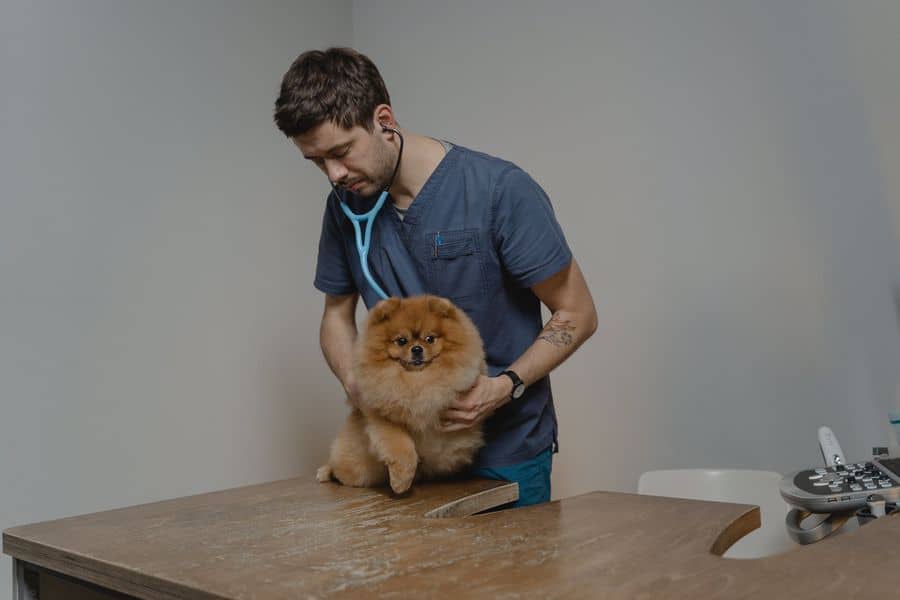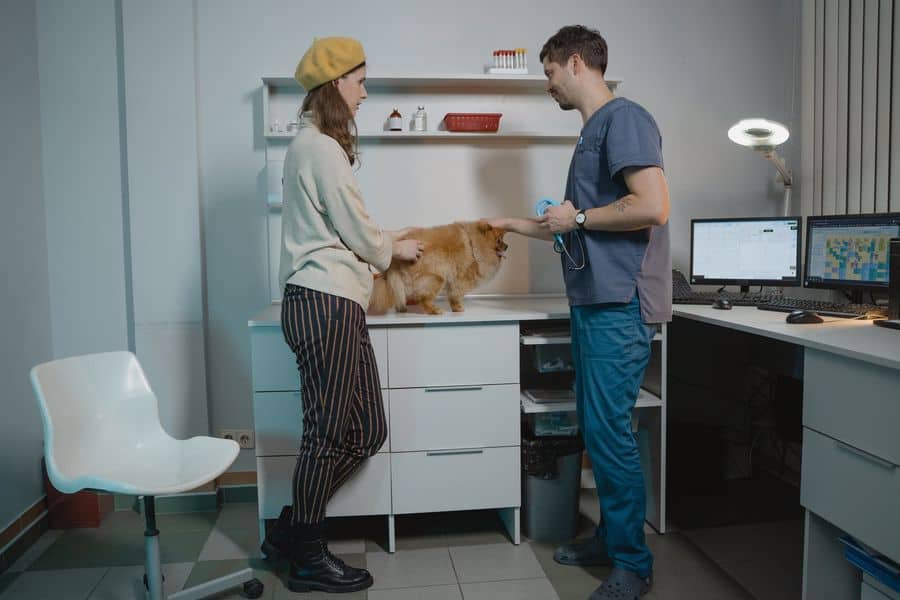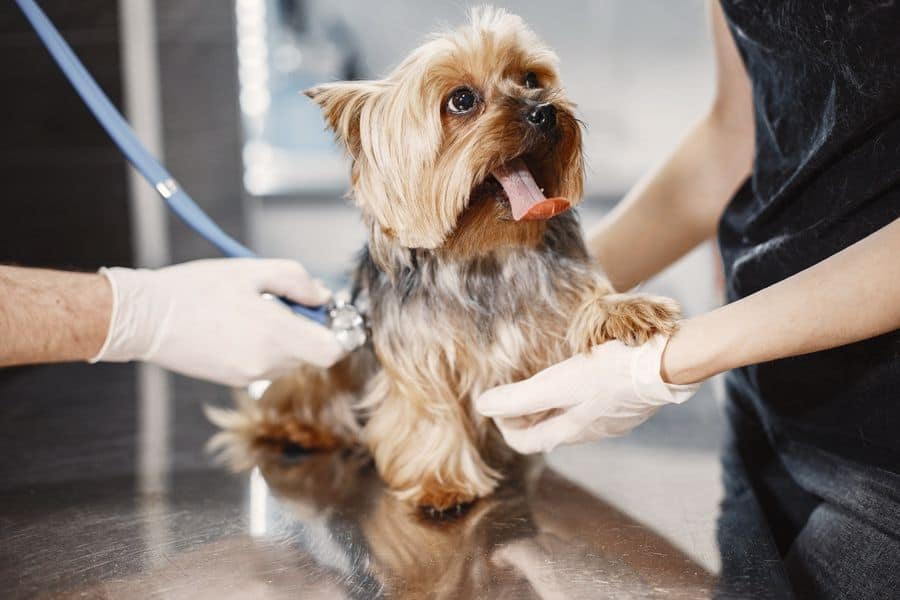Are you a first-time pup parent? The adorable little face and warm cuddles are probably the only things on your mind. However, keeping your new puppy happy requires a lot more than that. Asking the right questions could put you in a better position to be a fantastic parent. If you are wondering what questions to ask a vet with a new puppy or how to take care of it, here are a few helpful tips.
Contents
- 1 What Questions to Ask a Vet With a New Puppy?
- 1.1 What Is the Role of Vaccines?
- 1.2 Should I Potty Train My Puppy?
- 1.3 What Food Should I Be Feeding My Puppy?
- 1.4 When Should I Spay or Neuter My Puppy?
- 1.5 When Should My Puppy Visit the Vet Again?
- 1.6 When Should I Start Training My Puppy?
- 1.7 What Should I Expect at My Puppy’s First Vet Appointment?
- 2 Conclusion
What Questions to Ask a Vet With a New Puppy?
When you have a new puppy, keeping it healthy is probably the first thing on your mind. Bushy tails and bright eyes are not always indicators of good health. Sometimes, the only way to uncover an illness is through a thorough medical evaluation.
During our routine examination, I will check for respiratory, gastrointestinal, and skin issues. If there are any concerns, I will recommend solutions. This is especially important when you plan on introducing the puppy to your family. Other questions you can ask during a routine evaluation include:
What Is the Role of Vaccines?
Depending on their age, I will inform you about the various parasites and illnesses that threaten your puppy. I will further advise you on the best vaccines to get at different stages of the puppy’s development. Preventing diseases is a lot easier than treating them.
When creating a vaccination schedule for your pup, ensure that you have everything written down to avoid confusion. You must understand why each vaccine is recommended and the effects of skipping it. Vaccines that you are likely to need include:
- Rabies
- Distemper
- Parvovirus
- Bordetella
- Parainfluenza
- Hepatitis
Do you have other pets? The chances are that you can’t wait to introduce your new puppy to them. However, you shouldn’t do it before discussing it with me. I will probably suggest that you wait until you have completed the vaccination schedule.
Doing it too early could expose your puppy to Parainfluenza, Parvovirus, and Distemper. Upon clearance, you can go around other vaccinated dogs and take walks outside.
If I clear you to let your puppy go outside and meet other dogs, but the vaccinations are still ongoing, you need to take extra precautions. Keep your pup away from dog feces and minimize interaction with dogs whose health history you are unsure about.
Should I Potty Train My Puppy?
Potty training a new puppy is one of the most complex parts of ownership, but it is essential. It all comes down to consistency and proper preparation. I will empower you with the right information to take control of everything your puppy does.
From naptime to feeding and playing, everything your puppy does needs to be on schedule. Take note of how often they go potty through the day and find out if it is healthy.
Generally, they need more potty breaks during the day than at night. During the day, for example, a three-month-old may need to relieve themselves every 1.5 hours. However, they can hold it longer at night.
What Food Should I Be Feeding My Puppy?
This question may seem unnecessary, but it is crucial as all puppies are different. Every breed has unique dietary needs. Starting your pup off with the right diet is essential. It prevents skin problems, obesity, and allergies.
Usually, puppy food is rich in healthy fats and proteins that promote growth. Their dietary needs are different from adult dogs. With the wide variety of foods, including raw, kibble, and homemade, you need professional help to make the right selection.
Find out how often you need to feed your puppy. It is pointless to have the best foods for your puppy if you aren’t feeding them enough or overfeeding them. I will help you determine the ideal serving for your pup depending on their age and development needs.
Puppies generally need more food than adult dogs. Their portions need to be smaller but more frequent to maintain high energy levels and aid digestion. Reserve some of their kibbles to use as treats for the day to reward for good behavior.
When Should I Spay or Neuter My Puppy?
If you plan on neutering your puppy, I will advise you on the ideal time to do it. Although dogs can be spayed at any age, I would suggest that you wait until they are older. Talk to me and get recommendations based on your puppy’s age, genetics, size, and general health.
When Should My Puppy Visit the Vet Again?
Find out how often your puppy needs a trip to my clinic. During the first six months, your furry little friend will go through lots of changes. You may need to see me more often than usual. If it has any underlying health issues, you probably need to see me every few weeks. However, I highly recommend monthly wellness checks. Other puppies may only need to see me for their basic vaccinations.
When Should I Start Training My Puppy?
You need to start working on your dog’s behavior and basic cues during the puppyhood stage. It is the ideal time to work on behaviors like nipping and potty training. However, I will suggest more specific timelines.
I am likely to offer recommendations for the best private trainers and classes in the area. Having the best trainers on your team is crucial. It takes the pressure off of you and assures you that you are doing the right thing. The best ones use reward-based methods and positive reinforcement. Be wary of trainers who base their approaches on dominance.
What Should I Expect at My Puppy’s First Vet Appointment?
Your pup’s first appointment with me can be overwhelming. Knowing what to expect may put your mind at ease. Ask about the kinds of tests I will be performing, how long the appointment may last, and the information you may be required to provide. No question is the wrong question, ask away.
Conclusion
Your new puppy’s first trip to the clinic can be overwhelming. With the right questions, however, things can be easier. Professional advice will help you make the right decisions regarding your pup’s nutrition, vaccination, exercise, and grooming needs.



